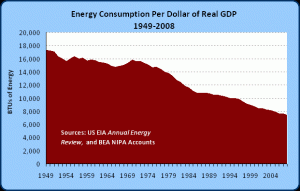You might be thinking, yes, energy is becoming a smaller portion of our incomes – but you are just playing games with numbers and prices. If energy prices were truly reflective of its REAL scarcity, we would not see the declining importance of energy.
Or would we?
The following chart plots a measure of energy efficiency from 1949 though today.
For every dollar’s worth of goods and services produced in America today, we use less than half the amount of energy to produce it than in the past. In other words, we are much more energy efficient today than we ever have been in the industrial era. In fact, energy efficiency seems to be improving almost monotonically.
And while it is true that the U.S. is a much more service oriented economy today than in the past, that is not a good explanation for this precipitous improvement in efficiency. We see similar trends if we look solely within the manufacturing and agricultural sectors. A cursory viewing of a show like Modern Marvels would tell you why. A given piece of machinery is able to produce massively more goods today than in the past. And that machinery has itself become more efficient. In fact, I would expect that these efficiency gains have been largest in the manufacturing and agricultural sector and smallest in the service sector.
Measured GDP almost surely understates the true standard of living we enjoy today – and changes in GDP almost surely have understated the true improvements to our living standards over time. While we do our best to capture this with GDP, how do you put a value on watching a college football game that is happening 3,000 miles from you while you recover from a non-invasive heart procedure in a craft-matic adjustable bed? If this is the case, then our measured improvement in energy efficiency would also be understated.
I’d remind you that these improvements have happened in the absence of an energy efficiency “czar” running around trying to make us all greener. These improvements have happened in the absence of a global agreement to use energy more wisely. Since energy is a cost of production, firms have an incentive to figure out ways to use less of it and to make their products more efficiently. Since energy is costly to consume, home owners, commuters, and workers all have an incentive to use is wisely so long as they recognize the costs of their usage.
Since energy is virtually infinitely abundant (certainly until the sun burns out a few billion years from now – what is scarce is our ability to harness this energy in a manageable way), and we have been using it much more efficiently over time, energy availability does not seem to be a serious threat to our standard of living unless massive government interference in that sector makes it so.

The object of the present regime is to increase the price of energy, which they think will create all kinds of benefits, as in employing people to make windmill propellers and solar panels, make it more economic to buy insulation (boosted by tax credits), and put the hoi polloi on light-rail transport. Such thinking has been employed many places before without success.
We have cheap energy because we are free, and that annoys the statists, who want to limit our hot shower time.